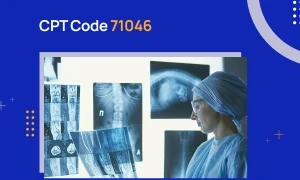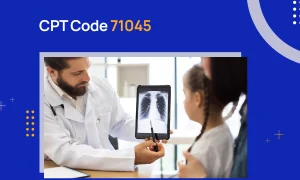If you have ever been to an operating room, you may have observed something. A team of healthcare professionals is present there to assist with the surgery. Oftentimes, the team includes not only nurses and supporting staff, but also other physicians and surgeons. This makes surgical procedures difficult to bill.
To receive fair and timely reimbursement in such scenarios, modifiers are essential. Modifier 80 is one such frequently used modifier in medical billing. This blog aims to clarify the confusion surrounding this vital billing tool.
In this guide, we will walk you through everything you need to know about modifier 80, from basic description to usage scenarios and some essential billing guidelines. So, let’s start.
Modifier 80 – Description
Modifier 80 is defined by the Centers for Medicare & Medicaid Services (CMS) as “Assistant Surgeon”. This modifier is used when, during the surgery, another physician actively assists the primary surgeon. However, please note that this modifier should only be used when a qualified physician (MD or DO) serves as an assistant at surgery. You should not use it to bill the services of a nurse, physician assistant, or other supporting staff.
The assistant surgeon must be present during the entire procedure or a significant portion of it, providing active assistance rather than merely observing. It distinguishes modifier 80 from other assistant modifiers that apply to minimal help or specific circumstances.
But how to bill it on a claim? The modifier is appended to the CPT code for surgery. Both the primary physician and the assisting physician should file the claims with the same CPT code. However, the assistant surgeon must append modifier 80 to his claim. Reimbursement rates for this modifier vary by payer type. Medicare reimburses assistant surgeon services at 16% of the Medicare Physician Fee Schedule (MPFS) amount.
Appropriate Use Cases for Modifier 80
Still confused? Let’s clear the picture with a couple of scenarios in which this modifier can be used.
Heart Surgery
Suppose a patient needs an open-heart surgery to fix blocked arteries. During the same procedure, he also needs a heart valve replacement. This is a complex surgery that requires the work of two or more surgeons. So, the lead heart surgeon performs the major work while a second surgeon helps for the entire 5-hour operation.
The helper surgeon holds things in place (retracting), stops bleeding (hemostasis), helps shift the heart into the correct position for the primary surgeon to work on it, and assists in removing blood vessels from other parts of the body that will be used for the bypass (graft harvesting).
In this scenario, you can observe that the assisting physician has performed a significant role and remained in the operating room for the entire procedure. So, modifier 80 can be used here.
Hip Replacement
Let’s consider another scenario. Suppose a patient needs a complete hip joint replacement. The assistant surgeon helps position the patient on the operating table and prepares the bone by cleaning and shaping it. He also drills and shapes the bone to fit the new hip parts and assists in placing the artificial hip joint into the correct position.
Having this extra surgeon is necessary because the procedure requires precise work and often necessitates two sets of hands working together. Therefore, in this case, the use of the 80 modifier is valid.
When Not To Use Modifer 80?
There are some limitations for the use of this modifier. You should not use the 80 modifier when:
- The assisting physician is not actively participating in the surgery and spends most of the time observing the procedure.
- When assistance is not provided by a qualified healthcare physician, but by nurses or supporting staff.
Accurate Usage Guidelines for Modifier 80
You cannot use this modifier with all claims in which assistance was provided. For this modifier to be valid, certain requirements must be met. Otherwise, your claims will be rejected by the insurance payer. The following are some essential points to consider while filing claims with the 80 modifier.
Use for Comprehensive Assistance
As we stated above, you should only use modifier 80 when the assisting surgeon is present for a significant portion of the surgery. Plus, it should be used when the assistant is actively helping the primary physician.
Use with Modifier AS
You can use the 80 modifier alone in your claims to bill for the services of a qualified physician. However, if during the surgery a Physician Assistant (PA), Nurse Practitioner (NP), or Clinical Nurse Specialist (CNS) helped, modifier AS should also be used.
What many billers miss and what you should remember is that if you are using modifier AS in your claims, you must also use modifier 80, 81, or 82 with it. Submitting a claim with only modifier AS is incorrect.
Verify the CPT Code Status
Before billing Medicare with modifier 80, providers must check the Medicare Physician Fee Schedule payment indicators for assistant surgery services. CMS Status Indicators provide four key designations:
- Code 0: Normally, Medicare will not pay for a surgical assistant for this procedure. However, if you can provide medical records showing why an assistant was necessary, they may approve payment.
- Code 1: Medicare will not pay for a surgical assistant for this procedure. This is a mandatory rule set by law.
- Code 2: Medicare allows payment for a surgical assistant for this procedure. There are no restrictions.
- Code 9: This classification does not apply to the procedure in question.
Modifier 80 vs. 82
We have already discussed the 80 modifier in detail. Let’s briefly go over the modifier 82 before the comparison.
Modifier 82 is used in teaching hospitals when no qualified resident is available to assist. Here’s a comparison between the two modifiers:
| Feature | Modifier 80 | Modifier 82 |
|---|---|---|
| Primary Use | General assistant surgeon services | Teaching hospital, no qualified resident available |
| Setting | All healthcare facilities | Usually teaching hospitals |
| Documentation | Standard operative report | Must document resident unavailability |
| Reimbursement | 16% (Medicare). Up to 20% (commercial payers) | 16% (Medicare). Up to 20% (commercial payers) |
Modifier 80 vs. AS
Modifier AS identifies non-physician practitioners providing assistant surgeon services. We have already stated this before, but here’s a reminder: Modifier AS must be used in conjunction with assistants at surgery modifiers, such as 80, 81, or 82, never alone.
Final Thoughts
Modifier 80 is used to bill the services of an assistant surgeon during a procedure. It is a frequently used modifier in medical billing, so learning to use it correctly is very important. Otherwise, you will lose a substantial amount of revenue due to claim denials.
Make sure to append this modifier to a valid surgical CPT code whose status indicator allows the use of this modifier. Hopefully, with this guide, you will have no problem using this vital modifier.
FAQs
What is the main difference between modifier 80 and modifier 81?
Modifier 80 indicates an assistant surgeon’s services throughout the surgery or a substantial portion of it. On the other hand, modifier 81 represents minimum assistant surgeon services. It is used when the assistant surgeon helps with a small portion of the procedure.
What is the difference between modifiers 62 and 80?
Modifier 62 identifies co-surgeons – two primary surgeons working together as equals, each performing distinct portions of the same procedure. While modifier 80 represents an assistant surgeon’s services, in which one surgeon (primary) leads the procedure, while the other provides help for the same surgery.



